[ad_1]
By Wedaeli Chibelushi & Habtom Weldeyowhannes, BBC News & BBC Tigrinya
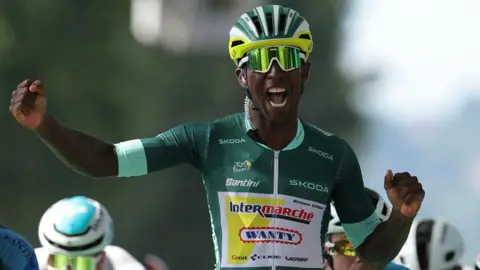 AFP
AFPTo his fans, he’s the “African king” – an international star and the first black African to win a Tour de France stage.
Biniam Girmay did that not only once but three times this year at road cycling’s premier event. Barring an accident, the 24-year-old looks set to win the green jersey on Sunday – a prize awarded to the best sprinter over the gruelling three-week competition.
But Girmay’s journey to the top has been riddled with obstacles – he has battled culture shocks, Europe’s visa procedures and the loneliness of being thousands of miles away from his wife and young daughter.
Now, he is embracing his role as a hero in his home country – Eritrea – and an inspiration for cyclists across Africa as a whole.
Many believe Girmay’s success will spark change in an overwhelmingly white sport – in this year’s Tour de France he is the only black rider in the whole peloton of 176 riders.
Girmay – or Bini to his loved ones and fans – was born and raised in Eritrea, a small East African country with a population of around 3.7 million.
Unusually, Girmay was never a champion of Asmara – the capital city he grew up in – or Eritrea. Instead, he appeared quite suddenly on the international stage after being scouted by cycling’s global governing body, the UCI.
Girmay told Eritrean media earlier this year that it is easier to win at the Tour de France than to be an Eritrean champion. This is because despite its tiny population, the country has a wealth of talented cyclists, many of whom have won medals in global and continental races.
Cycling is one of Eritrea’s most popular sports, a pastime picked up during decades of Italian colonial rule.
It is a source of pride for many Eritreans, whose country usually only makes global headlines for its border conflicts and a human rights record considered to be poor by rights organisations, but fiercely defended by the government.
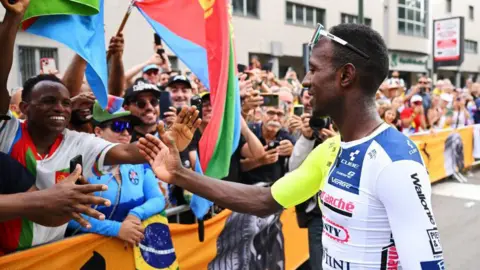 Getty Images
Getty ImagesGirmay’s dreams of becoming a cyclist were sparked by his cousin, African champion Meron Teshome.
The cycling obsession extends further into his family – his younger brother is now a professional rider and his father, a carpenter, used to watch the Tour de France on TV with Girmay every year.
This is My Moment, a documentary charting his rise, shows an elderly female relative telling him: “When I was young no-one could beat me, not even you!”
At 12 years old, Girmay won his first mountain bike competition and as a teenager he was selected to represent Eritrea as a junior in the African Championships.
While there, he caught the eye of a UCI scout.
They invited him to train at the organisation’s World Cycling Centre (WCC), an elite Swiss facility that hosts young athletes from countries where there may not be so many opportunities for development.
In 2018, at the age of 17, Girmay quit school and left home for Switzerland.
The transition was tough, he had no friends or family nearby and was hit by a huge culture shock.
“It was tough to prepare Bini; he had to change a lot of things: his lifestyle, his routines,” Jean-Jacques Henry, head of talent detection at the WCC, recalled as Girmay prepared for the 2023 Tour de France.
“It was too cold for him when he arrived in July. For us, it was warm. He didn’t like cobblestones [which riders of Girmay’s ilk often tackle] and he didn’t understand tactics.”
But he believed he would overcome these issues and realise his dream. He even took up English classes so he would not have to use a translator in media interviews when he eventually turned pro.
Sure enough, in 2020, Girmay was scooped up by French team Delko.
While training in France, he began planning his wedding with Saliem, his partner back in Eritrea.
But the 2020 coronavirus outbreak scuppered his plans to return home – and also left him unable to compete in Europe as several races got cancelled.
The following year, Girmay took another blow. Delko had gone bust, leaving the young cyclist without a team.
He was, however, able to travel back to Asmara and marry Saliem.
She later gave birth to a baby girl, but Girmay could not stick around for long as he had been signed by Belgian-based team Intermarché–Wanty.
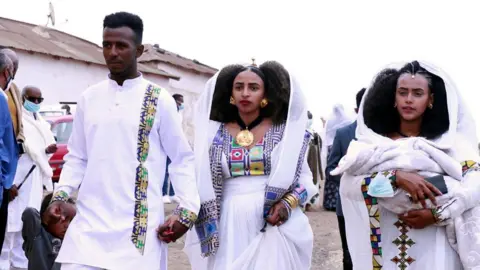 Cassette
CassetteSecuring a visa to continue his cycling odyssey was not easy – This Is My Moment documents the new father struggling to reach numerous visa application centres and embassies while in Asmara.
Eventually, he managed to acquire a long-term visa, which he holds to this day. However, as per its requirements, Girmay has to leave Europe’s Schengen zone of 29 countries every three months. He usually goes back to Asmara.
In 2022, the cyclist began his history-making streak.
At Belgium’s Gent-Wevelgem, he became the first African to win a one-day classic race. Girmay was part of a four-rider breakaway in the last 30km and sprinted to victory with 250m to go.
“Veni… vidi… Bini!” an ecstatic British commentator boomed as zoomed past finish line. The phrase, a play on the Latin for “I came, I saw, I conquered”, has become somewhat of slogan among his fans and the media.
As a sprinter, Girmay accelerates quickly towards the end of the race, embarking on a ferocious dash to the finish line.
He is rarity – as a mountainous country Eritrea mostly produces “climbers”, cyclists who race especially well on steep inclines.
Girmay topped his Gent-Wevelgem victory with another history-making stage win at Giro d’ Italia, which after the Tour de France is cycling’s second biggest Grand Tour race.
Celebrations were cut short when Girmay was taken to hospital – he had accidentally popped a prosecco cork in his eye on the winners’ podium.
He made a quick recovery, but without his wife and daughter around, he still struggled to enjoy his win.
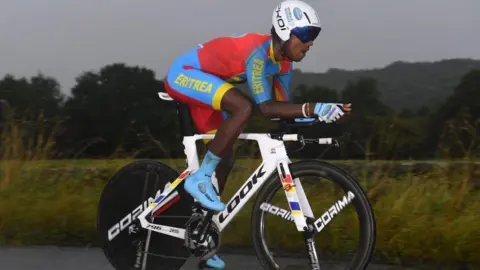 Getty Images
Getty ImagesDespite this homesickness, Girmay battled on. His wife and daughter eventually moved to French city of Nice – and will be waiting for him after the Tour ends on Sunday.
Also watching closely, will be cycling fans back in Eritrea.
After his third stage victory at the Tour, people spilled out onto the streets in Asmara, waving the national flag and dancing to a soundtrack of celebratory car horns.
Eritrean fans often turn up to support Girmay away from home too – at the 2023 Tour de Suisse one fan told the BBC: “He is an African king. We are proud. Eritrea is known for some bad things like war, now it is different.”
Girmay also represents the wider continent, Mani Arthur, who runs the Black Cyclists Network and has competed for Ghana, told the BBC’s Focus on Africa podcast last week.
“We don’t really see many black riders, especially from Africa, competing in the Tour de France,” he said.
“So to see Girmay not only be competing but to also win a much coveted stage is incredible. He’s proven himself to be amongst the best riders in the world.”
Eritrean cycling coach Aklilu Haile, who has known Girmay for a decade, believes his success can have a big impact.
“Sometimes cycling seems like it’s for white people only, but now he teaches us that cycling is for all the world,” he said.
Following the Tour de France, Girmay will take on this summer’s Olympics in Paris. He hopes to win a gold medal but this is unlikely – he is the only road cyclist representing Eritrea and therefore will not have anyone to lead him out in the peleton to secure a space for his sprint.
He also has high hopes for next year’s World Championships in Rwanda, the country in which he was first scouted by the UCI.
For many, a Girmay victory in Rwanda have huge significance.
Cycling fans from across the world would witness an African rider whizzing past a finish line on African soil, before being enveloped into a crowd flying the green, blue and yellow of the Eritrean flag.
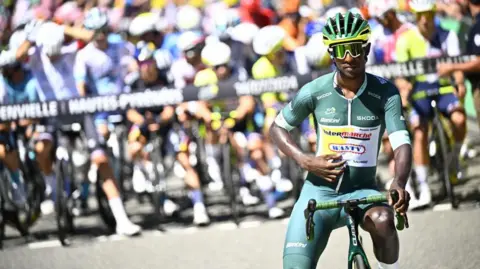 AFP
AFPYou may also be interested in:
 Getty Images/BBC
Getty Images/BBC[ad_2]
Source link freeslots dinogame telegram营销




